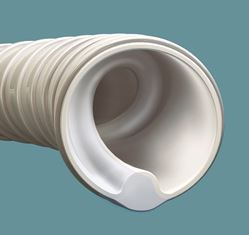St George's Hospital starts trial of spiral blood flow technology for blood vessel graft
29 January 2015
Dundee-based Vascular Flow Technologies has announced the start of a randomised controlled clinical trial at St George's Hospital, London of its proprietary spiral laminar flow (SLF) blood vessel graft.
The 189-patient trial will compare over 24 months the number and cost of interventions between the standard graft and using the spiral blood flow graft in patients with end-stage renal disease (ESRD) requiring dialysis.
It is believed that spiral laminar flow created by the graft reduces turbulence at the point where the blood flows into the blood vessel and that this limits changes to the blood vessel wall that may be precursors to thrombosis. The clinical effectiveness of SLF technology has been reported in a number of published studies.

The Spiral Laminar Flow
graft
The trial will use the Spiral Flow AV Graft and a standard polytetrafluoroethylene (PTFE) bridge graft. The main complication for PTFE grafts used for haemodialysis is thrombosis, which is reported to contribute to 70% of failures and these grafts show patency rates in published literature of 41-68% at one year5-9, and 25% at two years.
Mr Eric Chemla, Consultant Vascular Surgeon, St George’s Hospital, and lead investigator for the study commented, “St. George’s Hospital has one of the largest dialysis units in the UK, with a team of experienced vascular access surgeons, and a high throughput of this type of procedure. We are excited to be the trial centre for this study, which will produce clinical and economic evidence on the utility of this potentially game-changing technology.”
The haemodialysis access study is supported in part by a Scottish Enterprise Grant awarded to Vascular Flow Technologies. Bill Allan, CEO of Vascular Flow Technologies said: “We are truly delighted to announce the first patient into this trial. We are confident in our technology and are now pursuing trials that will consolidate the clinical evidence gained to date, and provide data for health economic appraisals.”
Source: Vascular Flow Technologies